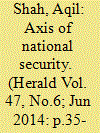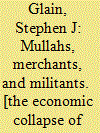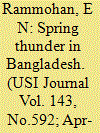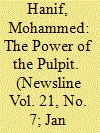| Srl | Item |
| 1 |
ID:
131272


|
|
|
| 2 |
ID:
108396


|
|
|
|
|
| Publication |
2011.
|
| Summary/Abstract |
This paper follows the careers of 'outlawed' Indian Muslim subjects who moved outside the geographical and political space of British India and located themselves at the intersection of nineteenth century trans-Asiatic politics: Hijaz, Istanbul and the Arab provinces of the Ottoman Empire, and Burma and Acheh in the East. These areas were sites where 'modern' Empires (British, Dutch, Ottoman and Russian) coalesced to lay out a trans-Asiatic imperial assemblage. The paper shows how Muslim 'outlaws' made careers and carved out their transnational networks by moving across the imperial assemblages of the nineteenth century. British colonial rule, being an important spoke in the imperial wheel, enabled much of this transnationalism to weld together. Webs of connections derived from older forms of Islamic connectivity as well: diplomacy, kinship ties, the writing of commentaries on Islam and its sacred texts in unique ways, oral traditions, madrasa and student contacts. These networks were inclusive and impacted by the tanzimat-inspired scriptural reformist thought in the Arab provinces of the Ottoman Empire. They were not narrowly anti-colonial in tone as they derived from a complex inter-play of imperial rivalries in the region. Rather, they were geared towards the triumph of reformist Islam that would unite the umma (community) and engage with the European world order. The paper shows how this imperially-embedded and individual-driven Muslim transnational network linked with Muslim politics rooted within India.
|
|
|
|
|
|
|
|
|
|
|
|
|
|
|
|
| 3 |
ID:
059953


|
|
|
|
|
| Edition |
1st ed.
|
| Publication |
New York, St. Martin Press, 2004.
|
| Description |
x, 350p.Hbk
|
| Standard Number |
0312329113
|
|
|
|
|
|
|
|
|
|
|
|
Copies: C:1/I:0,R:0,Q:0
Circulation
| Accession# | Call# | Current Location | Status | Policy | Location |
| 049302 | 909.0974927/GLA 049302 | Main | On Shelf | General | |
|
|
|
|
| 4 |
ID:
091465


|
|
|
|
|
| Publication |
2009.
|
| Summary/Abstract |
It was late February 2003, a few weeks before the U.S. invasion of Iraq, and President George W. Bush's administration still lacked a real strategy for the would-be regional hegemon next door.
|
|
|
|
|
|
|
|
|
|
|
|
|
|
|
|
| 5 |
ID:
127091


|
|
|
| 6 |
ID:
086037


|
|
|
|
|
| Publication |
2009.
|
| Summary/Abstract |
Maulvi Karim, who taught me to read the Quran and led prayers in our village mosque for 40 years, was one of the most powerless men in our community. The only power he assumed for himself was that of postman. The postman would deliver the mail to him and then he would walk from house to house distributing it. He would, of course, have to read the letters for a lot of families who couldn't read.
|
|
|
|
|
|
|
|
|
|
|
|
|
|
|
|